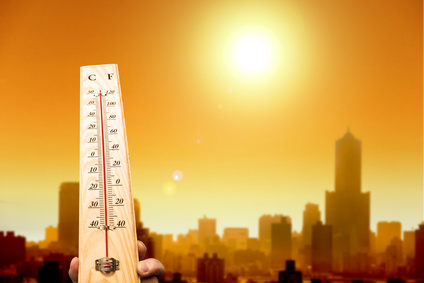Hot Heatwave Issues Landlords Need to Know About
Published on August 13, 2018 by Sarah Mac

The heatwave that has hit the UK has gone down in the history books for many reasons. Prolonged heat like this is unprecedented, and it is safe to say that as a nation, we’re not really geared up for it.
When the mercury rises, so certain issues climb to the surface. As a landlord, you may well experience a range of problems that would not normally occur in your properties. What these are, and how to deal with them, are what we’re looking at in this post.
Bugs
Hot weather draws out bugs, especially ants and flies. Ant infestations are not necessarily dangerous, but once they colonise areas of a home, they can be a real challenge to get rid of. Ant infestations must be dealt with immediately they are detected because the longer you leave it, the more difficult it will be to eliminate them. Be sure to advise your tenants to let you know if anything like this occurs.
Flies are well known for causing food poisoning. Keeping them out is important, so you may wish to consider fitting fly screens. These will also keep out biting and stinging insects, which your tenants will appreciate. Talk to them about other ways of keeping flies and insects out too, such as moving bins away from doors and windows, and getting rid of waste food promptly.
Bins
The odour from bins intensifies significantly in the heat. This could spark complaints to the local authority from neighbours and general passers-by if the bins at your property are not properly taken care of. And complaints could lead to a fine.
Make sure you provide sufficient waste disposal facilities: this is a legal requirement. Remind tenants of waste collection days and ensure they are educated as to the correct way to dispose of the different types of waste.
Grass
It’s tough to keep grass looking great in a heatwave, and of course you can’t expect tenants to spend fortunes on water and keep the grass moist, especially if there’s a hosepipe ban.
Whilst you may have set out a requirement for your garden to be kept in reasonable order, you must remember the word ‘reasonable’. In extenuating circumstances, you will need to make allowances.
Weeds
Quite the opposite of grass, weeds thrive in a heatwave. Unruly weeds can be unsightly, especially when they start to grow outside of a property’s boundary and onto the street or into a neighbouring garden.
Some weeds are particularly invasive, including Japanese Knotweed. This is a plant you really need to know about as a landlord because there is legislation covering it and other invasive, non-native plants. In short, action can be taken against neighbouring property owners where they have allowed such plants to grow onto their land. For more information on the legislation surrounding these plants, visit the RHS website page on Japanese Knotweed.
In summary, be sure to check whether you have any invasive species of plants on your land. If you do, you’ll need to take advice on their control or removal without delay.
Wood
There’s nothing like the look and feel of natural wood, particularly in an outdoor space. It does however need looking after if it is going to withstand the extremes of weather conditions we experience here in the UK.
Hot weather can be particularly damaging to natural wood, sometimes causing it to become brittle and prone to splitting. So, if you have decking in your garden, or any other structures made of timber, such as balconies or verandas, you’ll need to make sure you are up to date with your maintenance regime.
Remind your tenants of the importance of reporting any issues with hazardous wooden structures in the garden so you can action any repairs urgently.
Legionella
We discussed in a previous post the responsibilities of the landlord concerning Legionella. You’ll recall that Legionella can multiply wherever water is stored and/or recirculated and there is a food source such as sludge or scale.
During hot weather, it is common for tenants to make use of hot tubs, padding pools and air conditioning. All of which can become breeding grounds for Legionella if left unused for periods of time.
Remember, Legionella can be fatal if it leads to Legionnaire’s Disease, and can also cause flu-like symptoms if it causes Pontiac Fever.
It is a good idea therefore to familiarise yourself with your obligations as a landlord concerning Legionella risk management and control measures, all of which are summarised in our Legionella blog.
The calm before the storm?
We all know that in the UK, we don’t get away with a heatwave lightly. It is common knowledge that any lengthy spell of hot weather with inevitably end with storms and substantial rainfall, often leading to flooding where the parched ground is not able to cope with the sudden deluge of water.
Be mindful of what is to come following a heatwave. Ensure you have sufficient cover on your buildings and contents insurance for flood damage, and take time to make sure all your guttering, downpipes and drains are clear and secure and ready to take the strain of the rain.
A prolonged heatwave is a fairly unusual phenomenon in the UK, which means we’re not really geared up to deal with the consequences. But there are simple steps you can take as a landlord to safeguard your property. Follow the tips above and you will be able to sit back and relax with a chilled drink and enjoy the sunshine.

